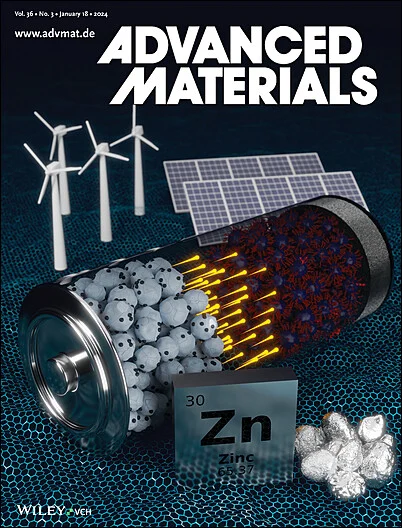Paving the Way for Next-Generation All-Solid-State Batteries: Dry Electrode Technology
IF 27.4
1区 材料科学
Q1 CHEMISTRY, MULTIDISCIPLINARY
引用次数: 0
Abstract
For the effective implementation of all-solid-state batteries (ASSBs), the progress of dry electrode technology is essential. Considering the urgent challenges posed by global warming, advancing affordable ASSBs is crucial for reliable and sustainable electrochemical energy conversion and storage systems. Despite the substantial progress in research on solid electrolytes, ASSBs continue to face fundamental challenges, including high manufacturing costs, considerable environmental impact, and insufficient interfacial stability. The dry electrode processing methodology presents a highly promising alternative to conventional wet electrode fabrication techniques, effectively addressing these limitations while facilitating scalable production capabilities. Although research on dry-electrode-based ASSBs has gained significant traction in recent years, the overall challenges are recognized as intricate due to the presence of multiple electrode components with diverse requirements and limitations. For the comprehensive review, the dry processing approach is systematically examined from the perspective of materials science and electrode processing. An electrode-component-level framework is adopted as well. Furthermore, crucial technical barriers are identified, and prospective research directions for the advancement of solid-state battery technology are delineated.

为下一代全固态电池铺平道路:干电极技术
为了实现全固态电池(assb)的有效应用,干电极技术的进步至关重要。考虑到全球变暖带来的紧迫挑战,推进价格合理的assb对于可靠和可持续的电化学能量转换和存储系统至关重要。尽管固体电解质的研究取得了实质性进展,但assb仍然面临着一些根本性的挑战,包括制造成本高、对环境的影响大、界面稳定性不足。干电极加工方法提供了一种非常有前途的替代传统湿电极制造技术,有效地解决了这些限制,同时促进了可扩展的生产能力。尽管近年来对基于干电极的assb的研究取得了显著进展,但由于存在多种电极成分,具有不同的要求和限制,因此总体挑战被认为是复杂的。本文从材料科学和电极加工的角度对干法加工方法进行了系统的综述。还采用了电极-组件级框架。此外,指出了固态电池技术发展的关键技术障碍,并对未来的研究方向进行了展望。
本文章由计算机程序翻译,如有差异,请以英文原文为准。
求助全文
约1分钟内获得全文
求助全文
来源期刊

Advanced Materials
工程技术-材料科学:综合
CiteScore
43.00
自引率
4.10%
发文量
2182
审稿时长
2 months
期刊介绍:
Advanced Materials, one of the world's most prestigious journals and the foundation of the Advanced portfolio, is the home of choice for best-in-class materials science for more than 30 years. Following this fast-growing and interdisciplinary field, we are considering and publishing the most important discoveries on any and all materials from materials scientists, chemists, physicists, engineers as well as health and life scientists and bringing you the latest results and trends in modern materials-related research every week.
 求助内容:
求助内容: 应助结果提醒方式:
应助结果提醒方式:


